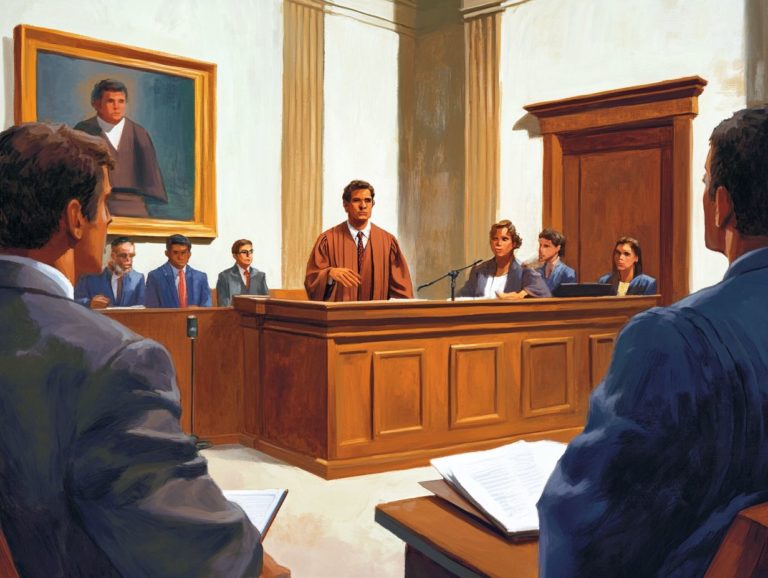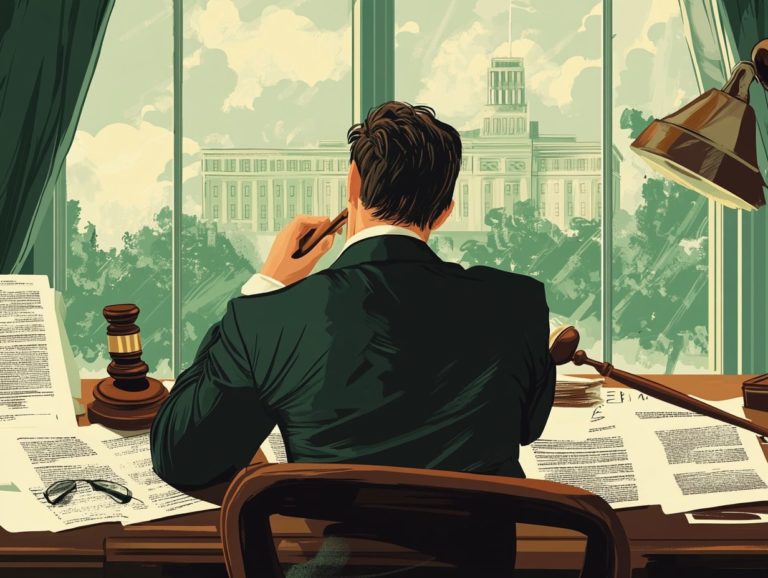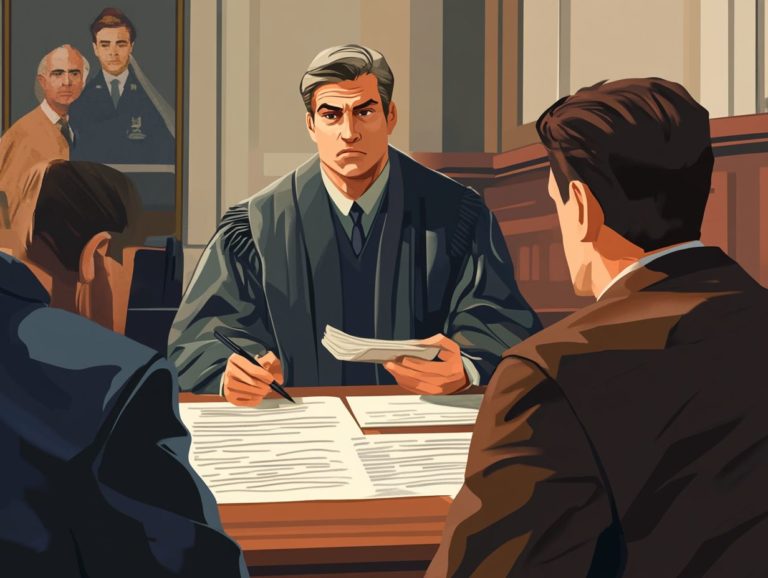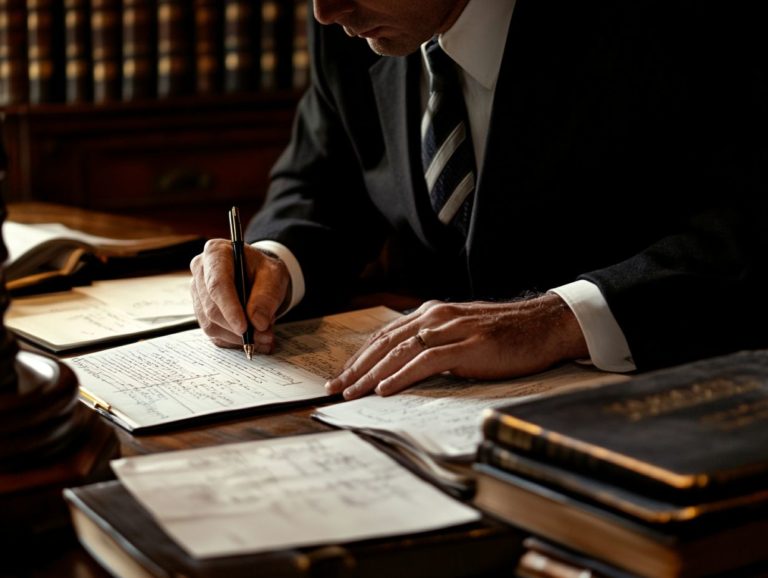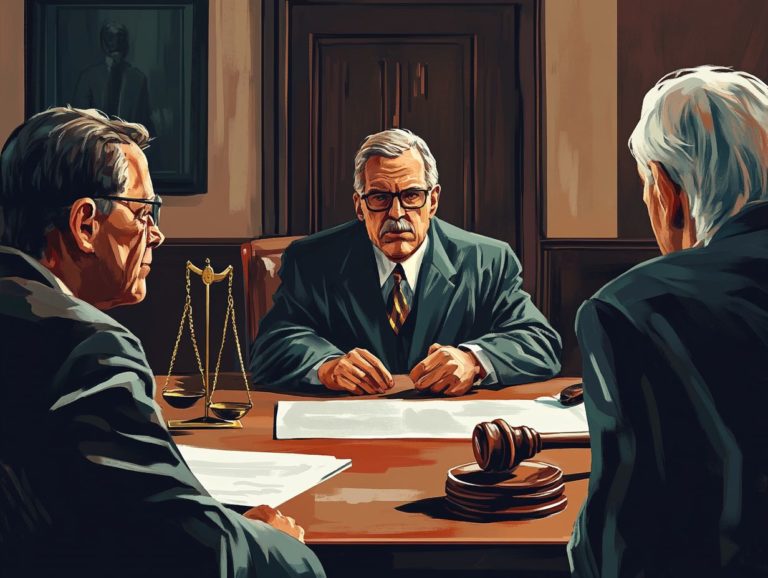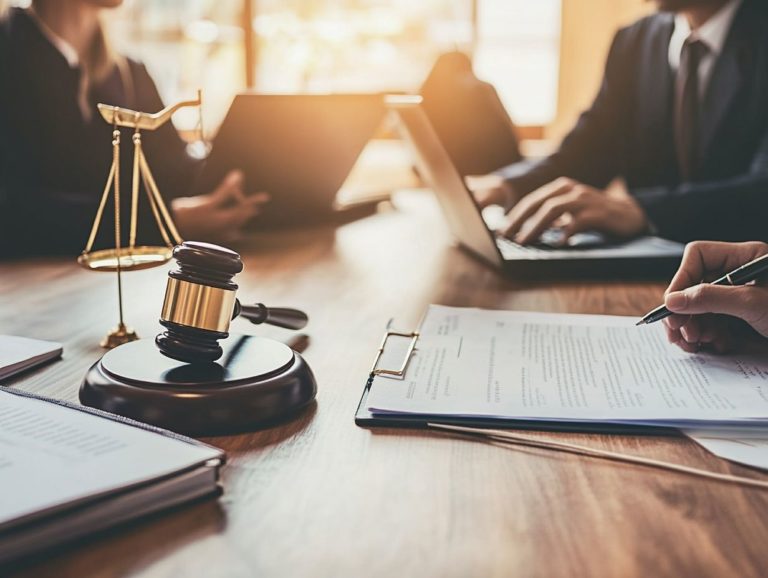What Happens After Arrest?
Being arrested can be overwhelming and confusing. Understanding the legal process is vital for navigating the challenges that lie ahead.
This article clearly explains each step following an arrest, helping you decode legal jargon and understand your rights during questioning.
It delves into the booking and bail processes, your legal entitlements including your Miranda rights possible outcomes of criminal charges, and why getting a lawyer is crucial for protecting your rights.
It also shows how an arrest affects your life, including your job and personal relationships. Read on to equip yourself with the knowledge necessary to navigate this challenging time with confidence.
Contents
Key Takeaways:

Getting arrested involves several steps that can affect your life in the long run. Knowing your rights, like Miranda Rights, is crucial as you go through this process. Navigating the legal system can be complex, but hiring a lawyer and understanding the potential impact on your life can help defend your case and mitigate consequences.
Understanding the Arrest Process
Understanding the arrest process is vital for anyone navigating the criminal justice system. It involves a series of legal steps designed to protect individual rights while ensuring public safety.
When a police officer makes an arrest, they typically follow specific procedures. This includes identifying the suspect, informing them of the charges, and securing them for transport to a police station.
Gaining insight into these processes can help you avoid potential legal issues and ensure that appropriate defense strategies are employed during subsequent stages like arraignment. An arraignment is when an official criminal complaint is filed, and the charges are formally presented.
Explanation of Legal Terminology
Understanding legal terminology is essential for navigating the complexities of the criminal justice process, especially terms like arrest, arraignment, and bail. These concepts play pivotal roles in how a case unfolds in court.
For example, the arraignment is the formal reading of charges against the accused, where they have the opportunity to plead guilty, not guilty, or no contest. This lays the foundation for their defense strategy.
Bail represents the financial assurance required for the accused’s temporary release while awaiting trial. This impacts their freedom and their ability to prepare for their defense adequately.
Understanding the role of a defense attorney is equally vital. They are your legal advocates, tasked with safeguarding the rights of the arrested individual. They ensure that all procedures are followed and challenge any unjust elements of the charges.
Immediate Steps After Arrest
Following an arrest, the initial steps you take can greatly affect what happens next in your case. This includes the booking process, where your personal information is carefully recorded, and arrangements for bail or release are established, often with the invaluable assistance of an attorney.
Booking and Bail Process
The booking process is a crucial phase that follows an arrest. During this time, police document your details and assess the conditions for bail, often involving a bail magistrate. Essential information gathered includes your identification, the nature of the offense, and any previous criminal history.
Once the booking is finalized, you may encounter various options for bail. These could include different types of bonds such as cash bonds or surety bonds along with specific conditions for your release, such as mandatory check-ins or travel restrictions.
Grasping these elements is vital for navigating potential outcomes effectively. This understanding enables you and your loved ones to make informed decisions that can significantly influence the legal journey ahead.
Legal Rights of the Arrested

The legal rights of those arrested, particularly the critical Miranda rights, are fundamental in guaranteeing that individuals receive fair treatment and that their due process is upheld within the criminal justice system. Due process means you have a fair legal procedure before any punishment is given.
Understanding these rights enables you to navigate the complexities of legal proceedings with confidence and clarity.
Miranda Rights and Due Process
Miranda rights represent a crucial set of legal protections for individuals in custody. They ensure you are fully informed of your rights, including the right to remain silent and the right to an attorney.
These rights trace their origins back to the landmark Supreme Court case Miranda v. Arizona in 1966. The Court highlighted the importance of informing suspects of their rights to prevent self-incrimination during police interrogations.
The primary purpose of these rights is to uphold the principle of due process, which means that everyone is treated fairly in the legal system. This protects you from pressure and ensures you can make informed choices throughout your legal journey.
In a broader context, due process embodies the essence of fairness in legal proceedings. It incorporates essential elements such as attorney-client privilege, which permits you to communicate candidly with your legal representatives. This creates a confidential environment vital for crafting effective defense strategies as you navigate the complexities of any charges against you.
Possible Outcomes of Arrest
The potential outcomes of an arrest can vary significantly, ranging from a dismissal of charges to a conviction. These outcomes are heavily influenced by several factors, including the nature of the criminal charges, the effectiveness of your defense strategy, and whether a plea bargain is negotiated during the trial process.
Criminal Charges and Sentencing
Criminal charges fall into two primary categories: felonies and misdemeanors. Each carries distinct implications for sentencing and the likelihood of conviction.
Felonies are generally deemed more serious offenses. They often result in harsher penalties, such as lengthy prison sentences or substantial fines.
Misdemeanors typically involve lesser offenses, leading to shorter jail terms or lighter fines. The outcomes of sentencing can differ dramatically; felony convictions might lead to several years in prison, whereas most misdemeanors usually result in sentences of less than a year.
Numerous factors can influence the final rulings, including the nature of the crime and the defendant s prior criminal history. These elements all play a crucial role in determining the consequences of criminal charges.
Navigating the legal system following an arrest demands that you make informed decisions, especially when it comes to selecting a lawyer who specializes in criminal defense. This choice is crucial, as a skilled advocate will ensure your legal rights are upheld throughout the trial process.
Hiring a Lawyer and Defending Your Case

Hiring a competent defense attorney is essential for effectively defending your case during trial. They can adeptly navigate the complex legal landscape, negotiate plea bargains, and ensure that your legal rights are firmly upheld.
When seeking legal representation, consider key qualities that define a strong defense attorney. Look for someone with experience in handling cases similar to yours and a proven track record of successful outcomes.
Excellent communication skills are also vital. These traits will enable you to be a more informed client.
Understanding various defense strategies is crucial, as they dictate the approach you’ll take during trials. This includes the option of pleading guilty in exchange for a reduced sentence through plea bargains.
Each strategy plays a pivotal role in securing the most favorable outcome, shaping not only the trial itself but also your entire legal journey.
Life After an Arrest
Life after an arrest can change everything! It can affect your job, home, and relationships in ways you might not expect, especially if a conviction or probation comes into play.
Impact on Employment, Housing, and Relationships
The impact of an arrest can be profound. It often creates significant challenges in finding a job, securing housing, and maintaining healthy relationships.
Having an arrest record can present substantial obstacles when applying for jobs. Many employers are understandably cautious about hiring someone with that background.
This wariness can lead to a frustrating cycle of unemployment, increasing financial instability, and fostering a sense of hopelessness.
The stigma from an arrest also affects the housing market. Landlords may reject applications based solely on your past.
This can make finding a safe place to live feel even more stressful!
In your personal life, relationships might become strained. Family and friends may struggle to grasp your situation, which can lead to feelings of isolation.
Discrimination can lead to anxiety and depression, further deepening the societal divide for those navigating the enduring consequences of their past choices.
Frequently Asked Questions
What happens after an arrest is made?
After an arrest, the individual is taken into police custody and brought to the station for processing. This includes taking fingerprints, a photograph, and personal information.
Do I have the right to legal representation after an arrest?
This image illustrates the right to legal representation after an arrest.
Yes, you have the right to legal representation. It is important to contact a lawyer as soon as possible to understand your rights and the legal process. Don t wait reach out to a lawyer today!
Will I be released on bail after an arrest?
It depends on the severity of the crime and your criminal history. If the judge determines that you are not a flight risk or a danger to the community, you may be released on bail.
However, if you have a history of not appearing in court or the crime is serious, you may be held without bail.
What happens if I cannot afford a lawyer after an arrest?
If you cannot afford a lawyer, one will be appointed to you by the court. This is known as a public defender.
However, public defenders may have heavy caseloads and might not be able to give your case the same level of attention as a private lawyer.
What is an arraignment after an arrest?
An arraignment is when you go to court to hear the charges against you. You will be asked to enter a plea of guilty or not guilty.
What happens after an initial court appearance?
After the initial court appearance, the case will proceed to a pre-trial conference or a preliminary hearing. This is where the prosecutor and your lawyer discuss potential plea deals or gather more evidence.
Depending on the outcome, the case may be dismissed or proceed to trial.

